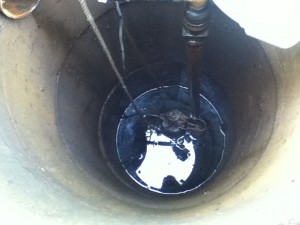 There are a wide range of reasons why sand mound systems can become odorous and there are luckily, many things that you as its owner can do to help. The sand mound, also known as the “raised mound” system, is generally a more than capable septic design which performs relatively trouble free, but a little common sense and understanding can go a long way in helping them remain running smoothly.
There are a wide range of reasons why sand mound systems can become odorous and there are luckily, many things that you as its owner can do to help. The sand mound, also known as the “raised mound” system, is generally a more than capable septic design which performs relatively trouble free, but a little common sense and understanding can go a long way in helping them remain running smoothly.
The mound system is comprised of lines with small perforations virtually identical to those found in a traditional leach or drain field system. The lines allow the passage of liquids leaving your tank, to enter downward into the surrounding soils that comprise your encased mound field. Like with any drainage field, bacteria and enzymes play a major role in how well the system performs since it is the microbes that digest the waste. In systems that have reduced microbe counts, the waste does not fully break down to passable levels and winds up slowly clogging the soils and gravel within the system.
When bacteria levels are suppressed, the incomplete digestion of the waste material creates excess gases or “smells”. The odors are always present but rarely escape the containment mound, thus you do not smell them. Once the pressures exceed a certain level, gases are driven up and into your yard. Most often that not, the odors are sensed directly around the sand mound area but can travel backward through the systems internal lines, right into your home.
While some passing odors and smells may occur from time to time without the need for much worry, a regular presence of odors coming from any septic system can mean that there is an underlying issue that will need to be corrected.
If you don’t think that your system is in serious trouble and you would like to try to help the smells disappear naturally, there are many things that you can do to help encourage the system to operate more efficiently.
Reducing your water usage will have an immediate effect on the systems internal pressure. Shorten up those showers and stagnate laundry loads so that you are not doing all of your wash on one day. Check for leaks in the home and consider switching all of your household cleaners over to brands that are less detrimental to bacteria. Many supermarket stores now carry alternative brands that will not be as harmful to bacteria and are priced competitively. Try several of the “green” type laundry liquids and dish soaps in hopes of finding those that perform satisfactory and are suitable for your household cleaning needs.
Remember that your septic system in its entirety is a living organism and will require attention now and then. Whether you are using all natural cleaners or more toxic brands, utilize a monthly septic additive to help compensate the damage that regular household cleaners have caused over the years. By adding bacteria regularly to your system, you will replenish much needed bacteria and help reduce the smells by helping the system to get back on its feet.